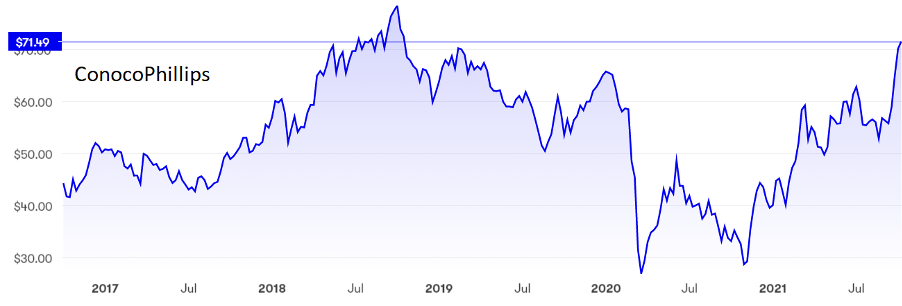Oil rally is chance to trouser profits at this top 100 company
6th October 2021 11:41
by Rodney Hobson from interactive investor
Up 160% in under a year, and with the world becoming a greener place, there is a strong argument for taking some money off the table at the $100bn giant.

Rodney Hobson is an experienced financial writer and commentator who has held senior editorial positions on publications and websites in the UK and Asia, including Business News Editor on The Times and Editor of Shares magazine. He speaks at investment shows, including the London Investor Show, and on cruise ships. His investment books include Shares Made Simple, the best-selling beginner's guide to the stock market. He is qualified as a representative under the Financial Services Act.
While environmental campaigners fight to bring the use of fossil fuels to a speedy end, oil, and to a much greater extent gas, will be around for years to come. Deals between rival producers will continue to be an important part of the way the sector continues to do business. Like it or not, shale drilling will also continue to play an important role.
Oil companies took a particularly big hit during the pandemic as demand fell off a cliff, taking the price of crude with it. Users were actually paid to take oil off tankers and out of storage facilities because the glut became so pronounced.
How circumstances have changed in the past 18 months. Major economies across the globe have bounced back faster and further than expected, while OPEC, the cartel of oil-producing companies, has refused to accelerate production to meet the extra demand. Users switching from gas to oil is estimated to have added 500,000 barrels a day to oil consumption.
Meanwhile, hopes that a rapprochement between the US and Iran would bring Iranian oil back into world markets have failed to materialise.
- Why the oil price just made a new three-year high
- Energy crisis: investor Q&A and share tips
- Want to buy and sell international shares? It’s easy to do. Here’s how
- Read all of Rodney's articles by clicking here
US crude oil prices have risen to their highest level in seven years at almost $80 a barrel. It is worth noting that each extra $1 a barrel in revenue for oil producers drops mostly through to the bottom line.
The latest big deal is the $9.5 billion acquisition by ConocoPhillips (NYSE:COP) of assets of Royal Dutch Shell (LSE:RDSB) in the Permian Basin in the southwestern part of US, stretching 300 miles by 250 miles across Texas and New Mexico.
Conoco, based in Texas, is now one of 100 largest companies in the US, valued at almost $100 billion. It produces 727,000 barrels of oil and 2.4 billion cubic feet of natural gas a day, mainly in the US, but with smaller operations in Norway, the Asia-Pacific region and the Middle East.
The deal will add 200,000 barrels of oil a day to Conoco’s output, making it the second-largest oil and gas producer in what is known as the Lower 48 states, that is mainland US except for Alaska. This moves Conoco above Chevron (NYSE:CVX), EQT Corp (NYSE:EQT), Occidental Petroleum (NYSE:OXY) and EOG Resources (NYSE:EOG) and just behind Exxon Mobil (NYSE:XOM), which is expected to produce about 1 million barrels a day from the Lower 48 this year.

Source: interactive investor. Past performance is not a guide to future performance
The price is admittedly a bit on the high side and the field yields high carbon oil, the type that European producers are moving away from as environment campaigners demand greener energy. However, at least the field is in production so there is an immediate revenue flow. In addition, adding this acquisition to Conoco’s existing acreage will allow a more efficient and therefore less expensive extraction of oil.
At the same time. Conoco is cleverly exploiting interest in its oilfields outside the US to sell off its international assets from a position of strength rather than conducting a fire sale.
- Five things investors must know about Britain’s energy crisis
- Take control of your retirement planning with our award-winning, low-cost Self-Invested Personal Pension (SIPP)
Share prices in the sector have on the whole fully recovered from the big dip suffered during the first three months of 2020. Conoco slumped from $65 to $25 but those brave enough to buy at the bottom have seen their holding bounce back to $72. After an increase in the dividend at the end of September the yield is 2.4%, but the price/earnings ratio of 63 is pretty demanding. A lot is riding on the Permian acquisition.
Hobson’s choice: the long-term problems facing oil producers in an increasingly environmental-conscious world will not go away, and there is also the fear that production will be stepped up either within or outside OPEC. The current Conoco share price is an opportunity to take profits.
Rodney Hobson is a freelance contributor and not a direct employee of interactive investor.
These articles are provided for information purposes only. Occasionally, an opinion about whether to buy or sell a specific investment may be provided by third parties. The content is not intended to be a personal recommendation to buy or sell any financial instrument or product, or to adopt any investment strategy as it is not provided based on an assessment of your investing knowledge and experience, your financial situation or your investment objectives. The value of your investments, and the income derived from them, may go down as well as up. You may not get back all the money that you invest. The investments referred to in this article may not be suitable for all investors, and if in doubt, an investor should seek advice from a qualified investment adviser.
Full performance can be found on the company or index summary page on the interactive investor website. Simply click on the company's or index name highlighted in the article.
Disclosure
We use a combination of fundamental and technical analysis in forming our view as to the valuation and prospects of an investment. Where relevant we have set out those particular matters we think are important in the above article, but further detail can be found here.
Please note that our article on this investment should not be considered to be a regular publication.
Details of all recommendations issued by ii during the previous 12-month period can be found here.
ii adheres to a strict code of conduct. Contributors may hold shares or have other interests in companies included in these portfolios, which could create a conflict of interests. Contributors intending to write about any financial instruments in which they have an interest are required to disclose such interest to ii and in the article itself. ii will at all times consider whether such interest impairs the objectivity of the recommendation.
In addition, individuals involved in the production of investment articles are subject to a personal account dealing restriction, which prevents them from placing a transaction in the specified instrument(s) for a period before and for five working days after such publication. This is to avoid personal interests conflicting with the interests of the recipients of those investment articles.